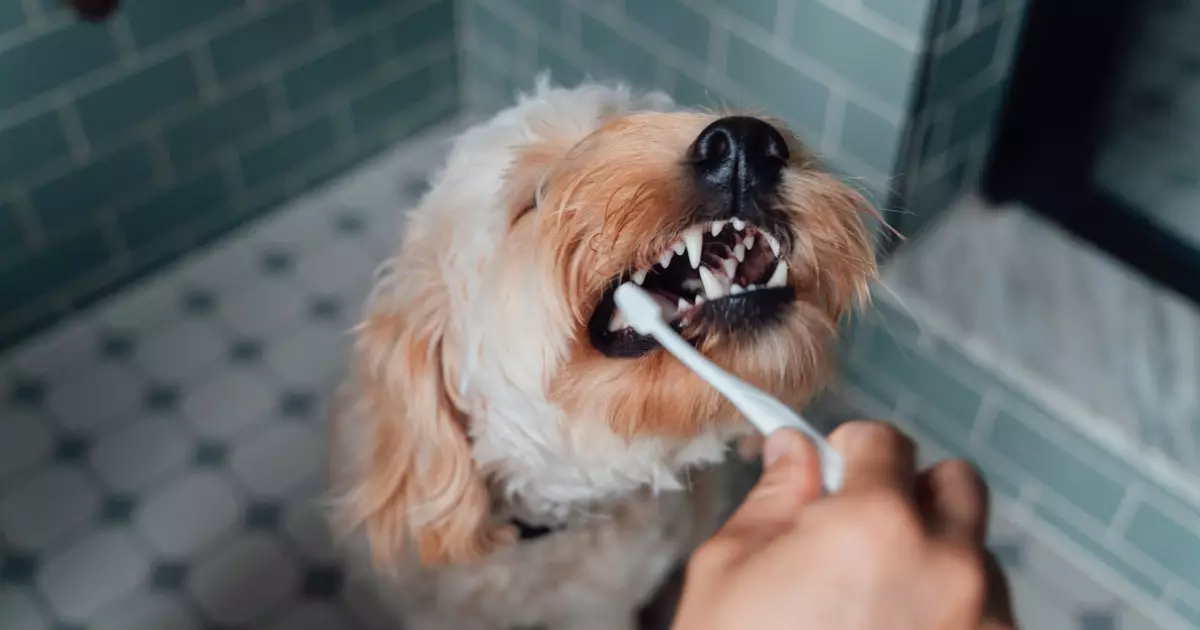Dental health is a critical aspect of overall wellness for dogs that is frequently overlooked by pet owners. Alarmingly, studies indicate that approximately two-thirds of dog owners neglect their canine companions’ dental hygiene, despite veterinarians strongly recommending routine dental care. The consequences of this negligence can be severe; by the age of three, an astonishing 80% of dogs display signs of oral disease. Without proper intervention, these dental problems can extend beyond the mouth, impacting vital organs such as the lungs, kidneys, and heart. Therefore, proactive dental care is paramount, beginning from a dog’s earliest days.
Recognizing the early signs of periodontal disease can make a significant difference in your dog’s health. One of the first indicators is often a noticeable change in breath odor—commonly referred to as “doggy breath.” If such symptoms arise, contacting your veterinarian for an evaluation is essential. The dental health journey typically starts with plaque formation; this thin layer of bacteria accumulates on the teeth and can lead to serious issues if left unmanaged. In the initial stages, plaque can be easily removed with regular brushing or through chewing on designated dental toys. However, failure to address plaque accumulation can lead to tartar buildup, which is much harder to eliminate.
If dental plaque continues to persist, gingivitis may develop, characterized by inflamed, swollen gums that are prone to bleeding. At this juncture, a professional dental cleaning becomes necessary to reverse the damage and restore gum health. Ignoring the signs of gingivitis can result in a far worse condition known as periodontitis, where infection can set in around the tooth roots. Without timely intervention, this leads to the deterioration of supporting tissues, potential tooth loss, and a painful experience for your dog. Fortunately, these complications can be entirely prevented through a consistent dental care regimen.
You should introduce dental care to your puppy from a young age. During initial vet visits, professionals can identify any dental issues, including missing teeth or abnormal growths. As your dog matures, regular dental evaluations become crucial. Vets often recommend a teeth-cleaning schedule, generally commencing from around the age of one year for smaller breeds and two years for larger ones. These cleaning sessions usually require anesthesia; hence, a pre-anesthetic examination is imperative to assess your dog’s fitness for the procedure.
A pre-anesthetic exam is a comprehensive evaluation that may include testing blood, urine, and even an electrocardiogram, all designed to gauge your dog’s health status before subjecting them to anesthesia. While anesthesia inherently carries certain risks, thorough monitoring can significantly mitigate these dangers. Vital signs such as heart rate, body temperature, and respiration are carefully observed throughout the cleaning process, ensuring your pet’s safety.
Dental X-rays can provide invaluable insights into your dog’s oral health. Often, these images reveal conditions that are invisible during a routine examination, enabling your veterinarian to make informed decisions about treatment options, which may include tooth extractions when necessary.
A dental cleaning for your dog is akin to what we experience at our dental visits, involving scaling and polishing to remove plaque and tartar buildup. The process is designed to ensure thorough cleaning and oral health. Some vets may apply substances akin to fluoride, reinforcing your dog’s teeth and inhibiting future plaque formation.
However, regular visits to the veterinarian should not be the only line of defense. As a pet owner, it is vital to actively engage in your dog’s oral health by brushing their teeth at home. Many specialized dental products are available in veterinary clinics and pet supply stores, making it easier to establish a consistent dental hygiene routine.
Investing time and care into your dog’s dental hygiene can pay off significantly, potentially adding up to five years to their life. Routine dental care not only enhances your dog’s quality of life but can also prevent a host of health issues down the road. Speaking to your veterinarian about personalized dental care strategies will equip you with the necessary tools to maintain your pup’s oral and overall health, ensuring a happier and longer life for your furry friend.
The importance of dental care in dogs cannot be overstated. With a little vigilance and commitment, pet owners can protect their companions from the detrimental effects of dental disease, leading to healthier, happier lives for our beloved pets.


Leave a Reply